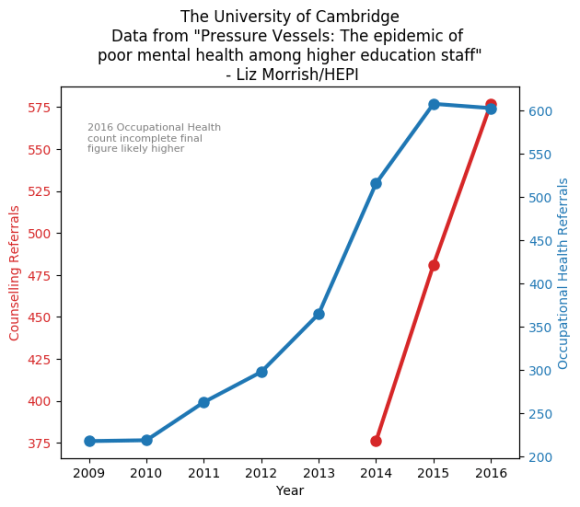Pressure Vessels: The epidemic of poor mental health among higher education staff, published by the Higher Education Policy Institute in May 2019, reports an escalation of signs of stress among University workers. Using FOI requests about referrals to University counseling services and occupational health, the report finds, since 2009, widespread, ‘sharp’, ‘astonishing’ and ongoing rises in the number of staff referred every year.
The report describes University work as an ‘anxiety machine’, where pressure to support student satisfaction, workload intensification, work allocation models, performance management and casualisation all combine to ramp up pressure on individual members of University staff. (These issues are precisely those which are the subject of the current UCU dispute and planned industrial action).
Sheffield Hallam UCU used this report, and the underlying data, to identify these statistics for their University: between 2010 and 2015 a 56% increase in staff referrals to University counselling; between 2015 and 2016 a 240% increase in referrals to occupational health.
This is in line with the industry-wide pattern. Extracting the data from the report, I drew the graph of total reported referrals of University staff to counselling (red) and occupational health (blue):

The data is broken down by institution, so I can pull out the data for the University of Sheffield. Here referrals to counseling grew by 2700% (from 30 in 2009, to over 800 in 2016). The occupational health data is not complete, so a comparison is not possible.
Here are graphs for a few other Universities:



A few “data caveats”
- The data are incomplete, so the total increase could be inflated by more institutions keeping records. Looking at the average figures reported each year, as well as these per-institution figures, shows that this possible confound is not driving the increase.
- If anyone wants to make some more FOI requests and get data for 2016-2019, I’ll make the graphs
- I have made graphs for all the institutions in the report. Look for yours.
- There are large differences in absolute numbers between institutions. If I had the number of employees of each institution I would like to calculate the rate of referrals per employee to allow better comparison across institutions.
- Many institutions have been making more effort to respond to poor staff mental health, however I think it would be wrong to view the increase in uptake of counselling as an entirely a positive thing – the bottom line is that increased uptake, and increased provision, are responses to the same underlying forces: unnecessary and unhealthy pressure on University staff.
Resources:
- Report: Pressure Vessels: The epidemic of poor mental health among higher education staff by Liz Morrish
- Underlying data: Nicky Michaels’ FOI requests at WhatDoTheyKnow.com
- About the strike: Explainer pages I put together during 2018’s strike action over pensions (note: this years actions are over pensions + pay & conditions).
- Data and code for making these graphs, as well as graphs for all Universities in the report
One reply on “Pressure Vessels”
University needs to review its lack of compassion towards the staff.
Staff shortages are increasingly placing staff under immense pressure, physically and mentally which is leaving them drained in every shape and form. This is constantly undervaluing staff as human beings and also professionally.
Wake up you people if you don’t then you will see a ‘brain drain’ akin to the 1960/1970s, then ask why didn’t I listen to the voice of reason in our society, by then you will have lost all the good faith of professionals, then what will you do, it will be too
late . Professionals will be in America,Canada, Australia, New Zealand, China and many other countries in the world, who will benefit from our tax payers, and, our professionals who have struggled financially to gain the best education for the professional career. This will
In turn will also not help students getting the best education,and, hamper our country in education and our country wealth in ever shape and form.
Eileen Hagan. (Mrs)